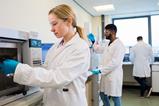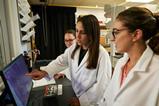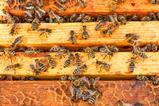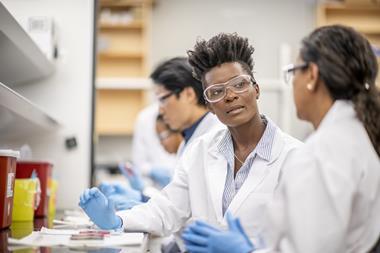Chemists who are the first in their immediate family to attend university face ongoing barriers not just at the point of entry, but throughout their careers, a new study shows. These include feelings of isolation, heightened financial pressures, reduced self-confidence and limited access to career guidance.
First-generation graduate chemists may also belong to other underrepresented groups in science such as ethnic minorities or people with disabilities. This intersectionality can make it difficult to isolate the specific obstacles linked to being a first-generation student. The study, co-led by Jennifer Hiscock and Jennifer Leigh from the University of Kent in the UK, therefore adopted a three-tiered approach to zone in on the unique challenges these individuals face.
First the team performed a literature review to ascertain what gaps there are in the study of first-generation graduate experiences. Using this information, they devised an online survey based on previous successful surveys by the international Women in Supramolecular Chemistry (Wisc) network; 136 people participated. Finally, the team conducted workshops at conferences that encouraged participants to reflect upon, and share, their lived experiences.
‘Being a First Gen is invisible as it coincides with other barriers,’ explains team member Mariam Yacoub, who took the lead in breaking down and analysing the results. ‘That’s why this [study] is important because it makes people think and reflect about if they are a First Gen and what that might mean for their students or their colleagues’.
The study found that first-generation graduate chemists are often encouraged into higher education by secondary school teachers but were less likely than non-first-generation graduate chemists to be invited to summer lab placements or other opportunities. First-generation graduate chemists were also 26% less likely to say they had family support.
They felt that the barrier was almost following them around
Upon starting higher education, first-generation chemistry students commonly reported having low expectations and finding it difficult to find guidance. Their lack of social capital made them feel isolated and 23% said they felt like imposters, compared to just 2% of non-first-generation students. The team found that such differences become more apparent further into an academic career. When asked about the barriers first-generation graduates might face, two-thirds of non-first-generation participants either did not provide an answer or indicated that they did not feel there were significant challenges for this group. Of those who did understand there were particular challenges, 86% were postgraduate or undergraduate students.
‘First gens felt that they were still missing so much information and still felt like they were on the back foot when it came to surpassing that first degree and getting to that next step,’ says Yacoub. ‘They felt that the barrier was almost following them around.’
The academic world can be difficult to navigate with no prior knowledge or advice to draw upon. In one workshop, a full professor said they felt isolated because others can take advantage of pre-existing networks to advance their career.
Hiscock says her team’s study is ‘helping those people that perhaps haven’t been seen before to be seen, or perhaps those people that have always felt a little bit ostracised understand why they are feeling the way they are and then they can do something about it proactively’. Many of the participants commented that first-generation graduate chemists should look to form their own network – be that peers or mentors.
‘There are important lessons about how those of us who are more established in the scientific community need to commit time on a personal level to mentor, listen and provide spaces where individuals can listen to and learn from one another,’ comments Caroline Dessent, a physical and analytical chemist at the University of York, UK, who previously chaired York chemistry department’s equality and diversity group. ‘This report shows us that individual and institutional actions like this, while benefiting all, will be of particular value to first gens.’
Stephen Hendry, programme manager for socioeconomic inclusion at the Royal Society of Chemistry, says the study, which was funded by the RSC’s inclusion and diversity fund, ‘focuses not on questioning the talent or ability of marginalised and minoritised individuals, but on recognising and addressing the barriers they face – particularly the lack of access to social capital, which can significantly influence opportunities, advancement and a sense of belonging.’
The team hope their study clearly illustrates that the chemistry community not only needs to proactively invite first-generation scientists into the community but also provide ongoing practical guidance on where to go for information on the course itself or finances, as well as having regular conversations about career expectations.
References
This article is open access
M Yacoub et al, Chem. Sci., 2025, 16, 10386 (DOI: 10.1039/d5sc00205b)

















1 Reader's comment